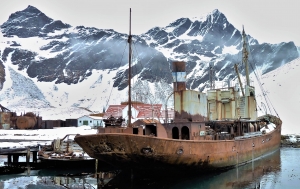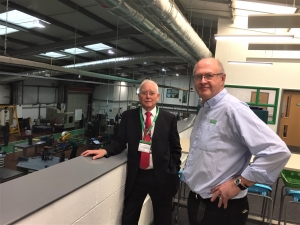HETA and Viola Trust target return of trawler
HETA and Viola Trust target to provide opportunities for young engineers
The charity behind the campaign to bring the Viola steam trawler back to Hull went behind the scenes at a leading engineering training provider to explore opportunities for young people to develop their skills by restoring the vessel.
The Viola Trust and Humberside Engineering Training Association (HETA) are now working on plans for a business event at the training centre to attract investment for the project and to show employers the skills being taught for marine engineering and other disciplines.
The Viola was built in Beverley in 1906 and operated from Humber Dock – now Hull Marina – as part of the Hellyer fleet of boxing trawlers. She was requisitioned to defend the UK in the Great War and left Hull for the last time in 1918 on a career which took her to Norway, Africa and Argentina, catching fish, hunting whales and elephant seals and supporting expeditions in the South Atlantic.
In the 1970s, Viola was mothballed after the closure of the whaling station at Grytviken, South Georgia. Sitting on the beach, where she remains, the old trawler was the target in 1982 of scrap metal merchants from Argentina. But when they landed they ran up the Argentine flag, an action which led to the Falklands War.
The Viola Trust is raising funds to bring the ship back to Hull and the hope is that it will form part of Hull City Council’s Hull: Yorkshire’s Maritime City project. But in addition to helping to promote the city’s nautical heritage and boost tourism, the Trust is eager to provide training opportunities as part of the restoration project.
HETA, which was founded in Hull more than 50 years ago, trains hundreds of apprentices every year on both banks of the Humber for careers in industry. Paul Escreet, Chair of the Trust and of Hessle-based tug owner and operator SMS Towage, visited the company’s headquarters in Hull to discuss the work of the marine engineering team which was established last year.
He said: “I was impressed by the quality of the facilities, the tutors and the learners and by the innovation and enthusiasm of everybody I met. Even with HETA’s long and proud history there was a recognition that the Viola presents a challenge from another age in terms of engineering techniques, but there is also a confidence that the team at HETA can do the job.
“I’m now looking forward to discussing the next steps, and in particular the idea of using the facilities at HETA including an excellent lecture theatre to bring together key figures from the regional business community to promote engineering training opportunities.”
Iain Elliott, Chief Executive of HETA, said: “The story of the Viola is both fascinating and inspirational and it is very exciting to think that our apprentices could have a part to play in her restoration.
“We were delighted welcome Paul to our centre in Hull and we hope very much that we can now work together to show the wider business community the importance of the Viola project and its potential for improving engineering skills, particularly in the maritime sector.”
Details of the Viola’s history and the campaign to bring her back to Hull can be found at the Viola Trust’s website at www.violatrawler.net
Ends.
Picture details
Main pic shows Paul Escreet (left) with Iain Elliott at HETA’s workshops in Hull.
Also a pic of the Viola on the beach at Grytviken.
Further information
Phil Ascough, 07944 123352.
The charity behind the campaign to bring the Viola steam trawler back to Hull went behind the scenes at a leading engineering training provider to explore opportunities for young people to develop their skills by restoring the vessel.
The Viola Trust and Humberside Engineering Training Association (HETA) are now working on plans for a business event at the training centre to attract investment for the project and to show employers the skills being taught for marine engineering and other disciplines.
The Viola was built in Beverley in 1906 and operated from Humber Dock – now Hull Marina – as part of the Hellyer fleet of boxing trawlers. She was requisitioned to defend the UK in the Great War and left Hull for the last time in 1918 on a career which took her to Norway, Africa and Argentina, catching fish, hunting whales and elephant seals and supporting expeditions in the South Atlantic.
In the 1970s, Viola was mothballed after the closure of the whaling station at Grytviken, South Georgia. Sitting on the beach, where she remains, the old trawler was the target in 1982 of scrap metal merchants from Argentina. But when they landed they ran up the Argentine flag, an action which led to the Falklands War.
The Viola Trust is raising funds to bring the ship back to Hull and the hope is that it will form part of Hull City Council’s Hull: Yorkshire’s Maritime City project. But in addition to helping to promote the city’s nautical heritage and boost tourism, the Trust is eager to provide training opportunities as part of the restoration project.
HETA, which was founded in Hull more than 50 years ago, trains hundreds of apprentices every year on both banks of the Humber for careers in industry. Paul Escreet, Chair of the Trust and of Hessle-based tug owner and operator SMS Towage, visited the company’s headquarters in Hull to discuss the work of the marine engineering team which was established last year.
He said: “I was impressed by the quality of the facilities, the tutors and the learners and by the innovation and enthusiasm of everybody I met. Even with HETA’s long and proud history there was a recognition that the Viola presents a challenge from another age in terms of engineering techniques, but there is also a confidence that the team at HETA can do the job.
“I’m now looking forward to discussing the next steps, and in particular the idea of using the facilities at HETA including an excellent lecture theatre to bring together key figures from the regional business community to promote engineering training opportunities.”
Iain Elliott, Chief Executive of HETA, said: “The story of the Viola is both fascinating and inspirational and it is very exciting to think that our apprentices could have a part to play in her restoration.
“We were delighted welcome Paul to our centre in Hull and we hope very much that we can now work together to show the wider business community the importance of the Viola project and its potential for improving engineering skills, particularly in the maritime sector.”
Details of the Viola’s history and the campaign to bring her back to Hull can be found at the Viola Trust’s website at www.violatrawler.net
Ends.
Picture details
Main pic shows Paul Escreet (left) with Iain Elliott at HETA’s workshops in Hull.
Also a pic of the Viola on the beach at Grytviken.
Further information
Phil Ascough, 07944 123352.

